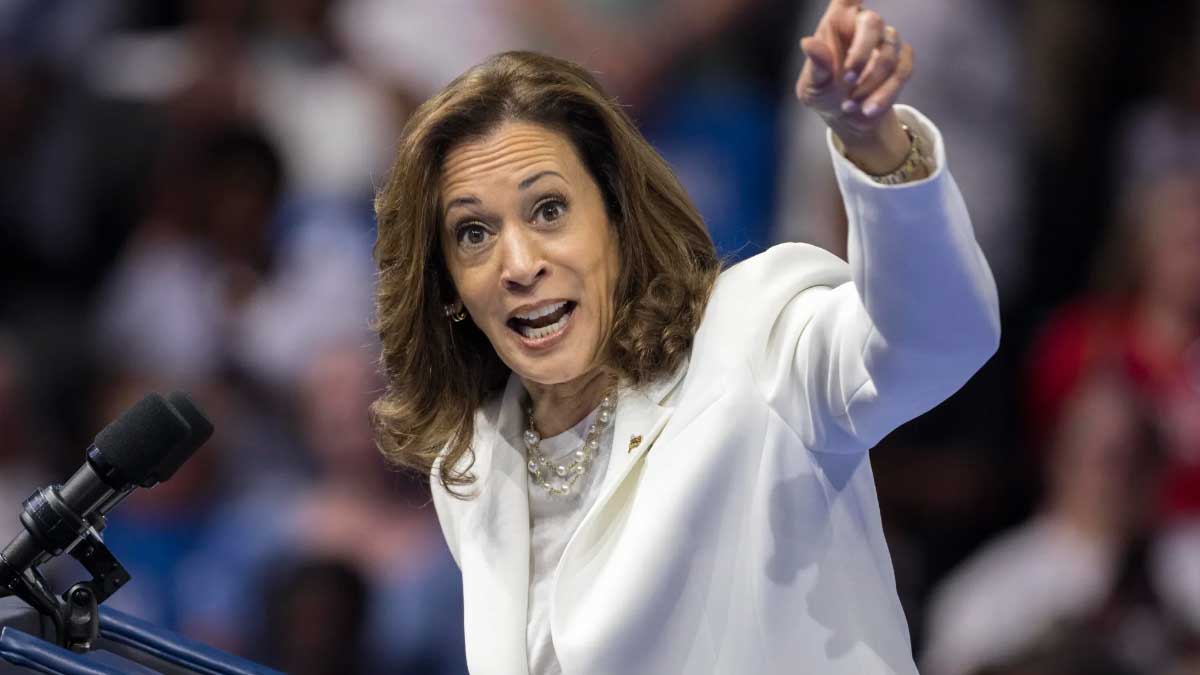- Home
- Billionaires
- Investing Newsletters
- 193CC 1000
- Article Layout 2
- Article Layout 3
- Article Layout 4
- Article Layout 5
- Article Layout 6
- Article Layout 7
- Article Layout 8
- Article Layout 9
- Article Layout 10
- Article Layout 11
- Article Layout 12
- Article Layout 13
- Article Layout 14
- Article Sidebar
- Post Format
- pages
- Archive Layouts
- Post Gallery
- Post Video Background
- Post Review
- Sponsored Post
- Leadership
- Business
- Money
- Small Business
- Innovation
- Shop
Recent Posts
Harris Revisits Fracking Position: A Shift in Energy Policy

Vice President Kamala Harris recently clarified her stance on fracking in an interview with CNN, a topic that has evolved significantly since her 2019 presidential campaign. Harris’ views on fracking, a method of extracting natural gas that has been both economically beneficial and environmentally controversial, have been the subject of scrutiny, particularly due to the inconsistencies in her public statements.
In 2019, during a CNN climate town hall, Harris unequivocally stated, “there’s no question I’m in favor of banning fracking.” This bold declaration aligned her with the more progressive wing of the Democratic Party, which has long advocated for stricter environmental regulations and a transition to renewable energy. However, this position also put her at odds with more moderate and centrist voters, especially those in states like Pennsylvania, where the fracking industry plays a significant role in the economy.
Fast forward to 2020, when Harris was the vice-presidential nominee alongside then-presidential candidate Joe Biden. During the vice-presidential debate with then-Vice President Mike Pence, Harris’ messaging on fracking appeared to shift. Rather than reiterating her previous support for a ban, she emphasized that Biden would not end fracking, a point that was crucial for the Biden-Harris campaign in maintaining support in key swing states. This statement was seen by many as a significant departure from her earlier stance, although Harris did not explicitly state that she had changed her position.
In the recent CNN interview, Harris addressed this apparent contradiction. She claimed that she has opposed a fracking ban since 2020 and that she made her position clear during the vice-presidential debate. However, her assertion that she has consistently been against a ban since 2020 raises questions, as her public statements prior to the debate suggest otherwise. Harris did not offer a detailed explanation for why her views on fracking have changed, but she did suggest that her current position reflects a belief that the U.S. can both grow its economy and transition to clean energy without resorting to a fracking ban.
This nuanced stance appears to be an attempt to balance the economic realities of fracking with the growing demand for environmental sustainability. Harris’ current position aligns with the Biden administration’s broader approach to energy policy, which emphasizes the importance of transitioning to clean energy while also ensuring economic stability, particularly in regions where fracking is a major industry. By not calling for an outright ban, Harris is likely trying to avoid alienating voters in swing states like Pennsylvania, which is the second-largest natural gas producer in the country and a state that played a pivotal role in the 2020 election.
Criticism of Harris’ shifting stance on fracking has been swift and pointed, particularly from former President Donald Trump and his allies. They have seized upon her 2019 comments as evidence of inconsistency and used them to paint Harris as a politician who changes her views based on political convenience. This line of attack is particularly resonant in Pennsylvania, where Trump and his supporters have worked to cast the Biden administration as hostile to the fossil fuel industry. By highlighting Harris’ past support for a fracking ban, they aim to weaken her appeal among voters who depend on the natural gas industry for their livelihoods.
The issue of fracking has long been a contentious one in American politics, encapsulating the broader debate over the country’s energy future. Advocates for fracking argue that it has helped the U.S. achieve energy independence, created jobs, and contributed to economic growth, particularly in rural areas. They also point out that natural gas, which is produced through fracking, burns cleaner than coal and can serve as a bridge fuel as the country transitions to renewable energy sources.
On the other hand, opponents of fracking highlight its environmental risks, including groundwater contamination, increased seismic activity, and the release of methane, a potent greenhouse gas. They argue that the long-term environmental costs outweigh the short-term economic benefits and that the U.S. should prioritize the development of renewable energy sources like wind and solar power.
Harris’ evolving position on fracking reflects the broader challenges that Democrats face in addressing climate change while also managing the economic realities of energy production. The Biden administration has sought to strike a balance by promoting clean energy initiatives and setting ambitious climate goals, such as achieving net-zero emissions by 2050, while avoiding policies that could lead to significant job losses in the fossil fuel industry. This approach is evident in Harris’ recent comments, which suggest a shift towards a more pragmatic stance that acknowledges the complexities of the issue.
During the CNN interview, Harris also addressed other key topics, including the economy and inflation. She defended the Biden administration’s handling of the economy, particularly in the aftermath of the Covid-19 pandemic. Harris noted that the administration inherited a challenging economic situation and emphasized the progress that has been made in lowering inflation and creating jobs. She also reiterated the administration’s commitment to making housing more affordable and addressing price gouging, which has been a concern for many Americans as the cost of living has risen in recent years.
Harris’ comments on fracking and the economy highlight the tightrope that she and the Biden administration must walk as they navigate the complex intersection of energy policy, environmental concerns, and economic realities. As the 2024 presidential election approaches, Harris’ ability to articulate a clear and consistent position on these issues will be crucial in winning over voters and maintaining the Democratic coalition that secured victory in 2020.
Recent Posts
Categories
- 193cc Digital Assets2
- 5G1
- Aerospace & Defense46
- AI37
- Arts3
- Banking & Insurance11
- Big Data3
- Billionaires446
- Boats & Planes1
- Business328
- Careers13
- Cars & Bikes76
- CEO Network1
- CFO Network17
- CHRO Network1
- CIO Network1
- Cloud10
- CMO Network18
- Commercial Real Estate7
- Consultant1
- Consumer Tech180
- CxO1
- Cybersecurity68
- Dining1
- Diversity, Equity & Inclusion4
- Education7
- Energy8
- Enterprise Tech29
- Events11
- Fintech1
- Food & Drink2
- Franchises1
- Freelance1
- Future Of Work2
- Games141
- GIG1
- Healthcare78
- Hollywood & Entertainment186
- Houses1
- Innovation42
- Investing2
- Investing Newsletters4
- Leadership65
- Lifestyle11
- Manufacturing1
- Markets20
- Media193
- Mobile phone1
- Money13
- Personal Finance2
- Policy567
- Real Estate1
- Research6
- Retail1
- Retirement1
- Small Business1
- SportsMoney33
- Style & Beauty1
- Success Income1
- Taxes2
- Travel10
- Uncategorized8
- Vices1
- Watches & Jewelry2
- world's billionaires415
Related Articles
Trump Moves $4B Stake in Truth Social Parent, Stock Drops 6%
Donald Trump recently transferred his 57% stake in Trump Media & Technology...
By 193cc Agency CouncilDecember 20, 2024House Rejects Trump-Backed Funding Bill, Shutdown Looms
The U.S. House of Representatives rejected a new government funding bill on...
By 193cc Agency CouncilDecember 20, 2024Trump Named Time’s Person of the Year for Second Time
On Thursday, Time magazine honored Donald Trump as its “Person of the...
By 193cc Agency CouncilDecember 12, 2024Meta Donates $1 Million to Trump’s Inaugural Fund
Meta, the parent company of Facebook and Instagram, has confirmed a $1...
By 193cc Agency CouncilDecember 12, 2024















Leave a comment